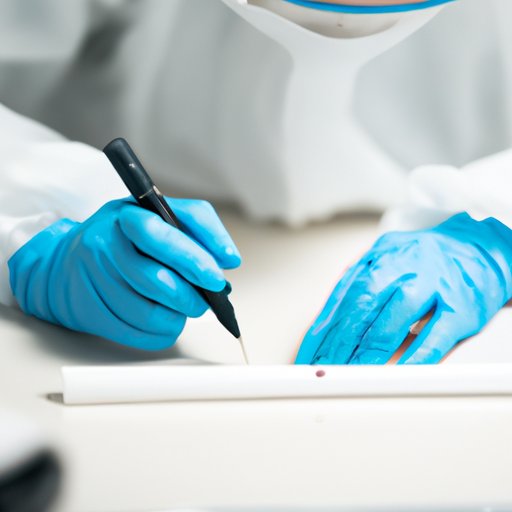Introduction
Forensic science technicians are responsible for collecting, preserving, and analyzing evidence from criminal investigations. They use their knowledge of science and technology to help solve crimes and provide expert testimony in court proceedings. This article will discuss the educational requirements, job duties, areas of specialization, challenges and rewards, and necessary certifications or licenses for becoming a forensic science technician.
Educational Requirements
The first step in becoming a forensic science technician is completing high school with a focus on science, math, and computers. It is also beneficial to take courses in chemistry, biology, and physics. After graduating from high school, it is recommended to pursue a college degree in forensic science or a related field such as biology, chemistry, or criminal justice.
In addition to a college degree, many employers require specialized certifications or licenses. These certifications may include the Certified Crime Scene Investigator (CCSI) or the Certified Laboratory Analyst (CLA).
Typical Job Duties
The primary responsibility of a forensic science technician is to collect, preserve, and analyze evidence from criminal investigations. This includes collecting samples of bodily fluids, hair, fibers, and other physical evidence. The technician must also use specialized laboratory equipment to conduct tests on the evidence. In some cases, they may need to testify as an expert witness in court proceedings.
Forensic science technicians may also be responsible for working in a lab setting, examining evidence, and providing expert testimony. They must be familiar with the law and legal procedures in order to effectively investigate and analyze evidence. Additionally, technicians must have strong writing and communication skills in order to prepare reports and present findings.
Areas of Specialization
Forensic science technicians can specialize in a variety of areas, including DNA analysis, toxicology, and crime scene investigation. DNA analysis involves collecting and analyzing genetic material from evidence in order to identify suspects or victims. Toxicology is the study of drugs and poisons, and technicians must be able to detect and identify substances in a variety of materials. Crime scene investigation involves gathering evidence from the scene of a crime, such as fingerprints, weapon fragments, and other physical evidence.
Challenges and Rewards
Working as a forensic science technician can be both challenging and rewarding. On one hand, it can be difficult to deal with the emotional aspects of criminal investigations, such as dealing with victims and their families. Additionally, technicians must maintain a high level of accuracy when collecting and analyzing evidence. On the other hand, the work can be very fulfilling and there is potential for career advancement.
“I think the most rewarding part of my job is being able to make a difference in people’s lives,” says forensic scientist Karen Miller. “I’m able to use my skills to help solve crimes and bring closure to victims and their families.”
Necessary Certifications or Licenses
In order to become a forensic science technician, individuals must obtain certifications or licenses. Certifications are typically offered by professional organizations and vary depending on the area of specialization. For example, the American Board of Criminalistics (ABC) offers certifications in forensic science, crime scene investigation, and laboratory analysis.
Requirements for obtaining certifications vary, but generally include a combination of education, experience, and passing an exam. Some certifications require renewal every few years, while others do not expire.
Resources for Further Research
If you are interested in becoming a forensic science technician, there are several resources available to help you learn more about the field. Professional organizations such as the American Academy of Forensic Sciences (AAFS) and the National Institute of Justice (NIJ) offer information about careers and certifications. Additionally, there are numerous online resources, books, and publications that provide further information about the field.
Conclusion
Becoming a forensic science technician requires a combination of education, certifications, and experience. Technicians must have a thorough understanding of science, technology, and the law in order to effectively collect, preserve, and analyze evidence. Working in this field can be both challenging and rewarding, and there is potential for career advancement. With the right education and training, individuals can pursue a successful career as a forensic science technician.
(Note: Is this article not meeting your expectations? Do you have knowledge or insights to share? Unlock new opportunities and expand your reach by joining our authors team. Click Registration to join us and share your expertise with our readers.)
